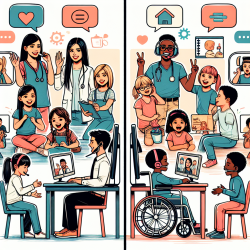The concept of Paid Family Leave (PFL) has been gaining traction as a pivotal strategy in the prevention of family violence, including child maltreatment and intimate partner violence (IPV). The research article "Paid Family Leave: An Upstream Intervention to Prevent Family Violence" sheds light on the potential of PFL as a proactive measure to address these critical issues. This blog post aims to guide practitioners in enhancing their skills by implementing the outcomes of this research or by encouraging them to delve deeper into further studies.
The Role of Paid Family Leave in Preventing Family Violence
PFL programs provide income replacement during significant family events, such as the birth of a child. This financial support is crucial in mitigating stressors that often lead to family violence. The research highlights that economic challenges are a major risk factor for both child maltreatment and IPV. By alleviating financial stress, PFL can potentially reduce the incidence of these forms of violence.
Key Findings from the Research
- Economic Stability: PFL contributes to household financial stability, reducing stress and conflict within families.
- Improved Parent-Child Relationships: Time away from work allows parents to bond with their newborns, fostering healthier relationships and reducing the risk of maltreatment.
- Father Engagement: PFL encourages fathers to take an active role in childcare, promoting gender equality and reducing IPV risk.
- Decreased Relationship Conflict: Financial support during leave reduces economic strain, which can alleviate relational tensions that lead to violence.
Implementing Research Outcomes in Practice
PFL offers a promising approach for practitioners aiming to prevent family violence. Here are ways practitioners can integrate these findings into their work:
- Advocate for Policy Change: Engage with policymakers to promote the adoption of PFL policies at both state and national levels.
- Educate Families: Inform families about the benefits of PFL and how it can support them during critical periods like childbirth.
- Create Support Networks: Develop community programs that provide additional resources and support for families utilizing PFL.
- Pursue Further Research: Encourage ongoing research into the long-term impacts of PFL on family dynamics and violence prevention.
The Need for Further Research
The existing evidence suggests that PFL has significant potential in preventing family violence, but more empirical research is needed. Practitioners are encouraged to contribute to this growing body of knowledge by documenting outcomes and sharing insights from their experiences with PFL implementation.
Paid Family Leave: An Upstream Intervention to Prevent Family Violence










